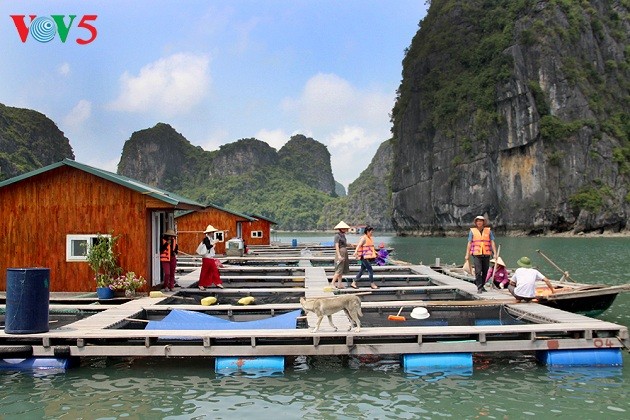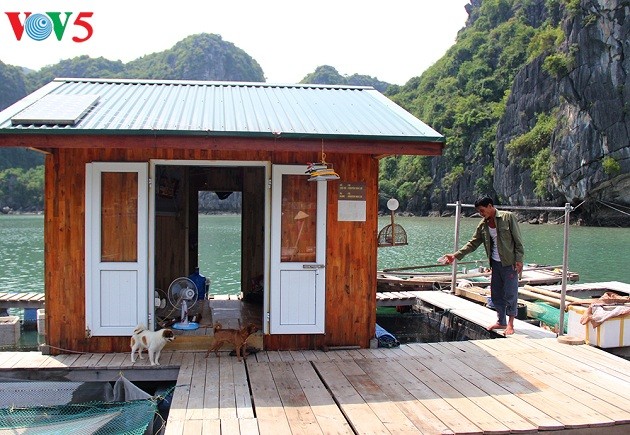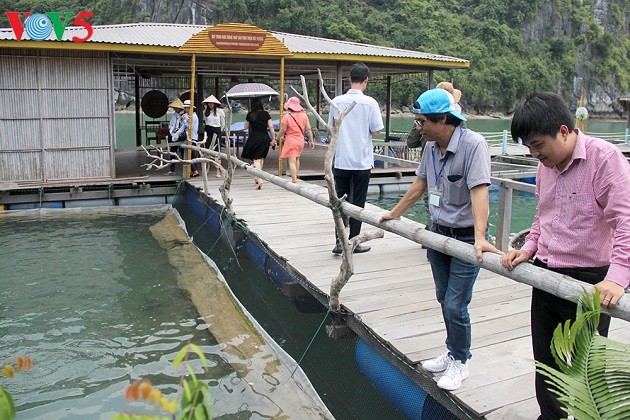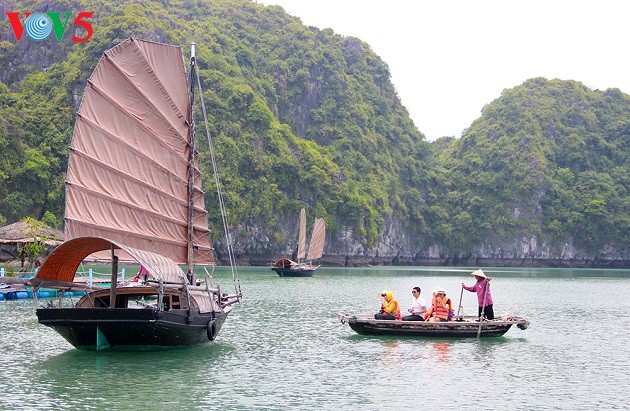(VOVWORLD) - Living in harmony with nature, conserving environmental resources, and preserving marine culture have created a means of subsistence for the fishermen who live in Ha Long Bay. Now a pilot project is opening a new direction for these people, who are moving ashore.
 The fish cages are built in line with set standards but retain the traditional features of Vietnam's old fishing villages. (Photo: Truong Giang) The fish cages are built in line with set standards but retain the traditional features of Vietnam's old fishing villages. (Photo: Truong Giang) |
Nguyen Van Loi lives in Vung Vieng, a hundred-year-old fishing village on Ha Long Bay which has become a popular tourist destination.
Loi’s houseboat has 12 aquaculture cages full of profitable species of fish like perch, garrupa, and cobia. The houseboat is made of a wood-plastic composite instead of environmentally-unfriendly styrofoam floats and Loi raises his fish in a standard and sustainable way.
 A housefloat can accommodate one or two people. (Photo: Truong Giang) A housefloat can accommodate one or two people. (Photo: Truong Giang) |
Loi was one of the first 7 local households to switch over to environmentally-friendly aquaculture to support the new “responsible” tourism being promoted on Ha Long Bay. The pilot project began last year as part of the Ha Long-Cat Ba Alliance Initiative financed by the Centre for Marine Life Conservation and Community Development (MCD) and USAID.
In 2014, Loi and more than 300 other fishing families living on Ha Long Bay went ashore for resettlement in line with Quang Ninh provincial policy.
Loi said he and his fellow villagers are happy to return each day to their beloved aquaculture on the bay.
“In the past, we raised fish. Then we moved ashore but couldn’t find a job. Thanks to the project’s financing, raising fish has become much easier. I just spent 1,320 USD to buy fingerling. The project has given us a new way to do business sustainably,” Loi added.
Tang Van Phien, Director of the Van Chai Ha Long Tourism Service Cooperative, said that before resettlement Vung Vieng was famous for breeding caged fish.
|
 Fish are raised in an environmentally-friendly way Fish are raised in an environmentally-friendly way
|
But the fishermen used substandard food to feed the fish in a confined area, which caused pollution and harmed the sea grass and coral. And the daily release of detergents and other chemical substances into the sea by hundreds of families damaged the living aquaculture environment. This caused mass fish deaths in Vung Vieng in 2010.
Phien said fishermen have received financing to upgrade their houseboats, been taught better aquaculture techniques, been provided standard industrial food, and been linked to reliable outlets.
“Sustainable aquaculture requires certain factors: You must manage the input of fingerling and their origin, control diseases right from the beginning, control food resources, and apply a standard raising process. You can’t use any biological products such as antibiotics on fish raised in the bay. In the future, Vietnamese Good Agriculture Practice (VietGAP) standards and geographical indications will be applied. In that way, we can achieve sustainable economic efficiency,” according to Phien.
Ha Long Bay’s magnificent landscape makes Vung Vieng a popular tourist destination. In 2013 and 2014 about 160,000 people visited each year, attending community activities, sightseeing on sailboats, and visiting fishermen’s houseboats.
 60 Vung Vieng natives are now involved in transporting tourists to fishing villages. 60 Vung Vieng natives are now involved in transporting tourists to fishing villages. |
Vung Vieng native Nguyen Thi Hang, one of 60 boatpersons who transport the tourists, said: “I earn 132 USD a month from transporting tourists. Though that’s too little money to meet my daily expenses, it’s better than people ashore are able to earn. We live on the bay and are aware of the need to protect the environment.”
Ho Thi Yen Thu, Deputy Director of the Centre for Marine Life Conservation and Community Development, talked about the project: “The project has received much attention from Quang Ninh provincial authorities in regard to protecting the environment of Ha Long Bay and boosting local incomes. We have gained the trust of the fishing community, who are eager to return to work on the Bay. We hope that the new model will be expanded to ensure sustainable use of natural resources in coastal areas.”
By 2018, there will be 32 aquaculture cages following the model. Beginning this month, Vung Vieng fishermen will have an additional model: raising oysters for pearls.